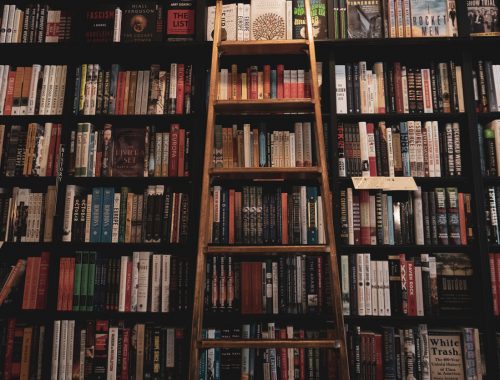
No More Fluff and Puff: Your Customized MFA Reading List
If you read good books, when you write, good books will come out of you.
~ Natalie Goldberg
I read for pleasure, first, but also more analytically, conscious of style, of diction, of how sentences were formed and information was being conveyed, how the writer was structuring a plot, creating characters, employing detail and dialogue. And as I wrote, I discovered that writing, like reading, was done one word at a time, one punctuation mark at a time. (…) I read closely, word by word, sentence by sentence pondering each deceptively minor decision the writer had made. And though it’s impossible to recall every source of inspiration and instruction, I can remember the novels and stories that seemed to me revelations: wells of beauty and pleasure that were also textbooks, private lessons in the art of fiction.
~ Francine Prose (Reading Like a Writer)
Your Reading List
Now that you have a game plan in place for your customized MFA, it’s time to decide on your reading list. You may find it enjoyable to flop down on the sofa to read fluff and puff, but this is your MFA. These authors are your professors, so choose them wisely. The reading you do should enhance the writing you produce. With that in mind, there are several types of books you should include:
- Books about writing
- Classics
- Modern literature
- Books outside your usual style/genre
- Anything that inspires you to write
Books about Writing
In addition to Strunk and White’s Elements of Style, (or whichever road map and guidebook to the English language you prefer), you should search out books that talk about the craft of writing. Of course, there are so many out there (I’ve written one, myself) that it can be difficult to choose which will be helpful and which will end up being a waste of time and effort. Doing a quick Internet search of “best books on writing” reveals dozens of options. Which should you choose? You can start with books written by (or pieces collected from) authors you respect – Mary Oliver, John Gardner, Edith Wharton, Margaret Atwood, Ray Bradbury, Eudora Welty, Ursula K. Le Guin, Annie Dillard, Anne Lamott, Stephen King, Ernest Hemingway, E.M. Forster, etc.
Beyond that? This is where online reviews come in handy. When I’m considering a new book on writing, I’ll head over to Amazon. I can (usually) look through the first few pages, and I’ll scan the reviews to see what other readers have to say. Generally, I’ll isolate the highest ratings and the lowest ratings in order to get a sense of a book’s strengths and weaknesses. Some writers adore Bird by Bird by Anne Lamott. Others find it too simple and anecdotal. Some love Stephen King’s On Writing. Others find it too heavy-handed and pompous. Reviews will let you see an author’s slant before spending your money, time and energy discovering it for yourself.
Some of my favorite books on writing are:
- Brenda Ueland’s If You Want to Write
- Richard Hugo’s The Triggering Town: Lectures and Essays on Poetry and Writing
- Sol Stein’s Stein on Writing
- Stephen Koch’s The Modern Library Writer’s Workshop: A Guide to the Craft of Fiction
- Virginia Tufte’s Artful Sentences: Syntax as Style
- Stephen Fry’s The Ode Less Travelled: Unlocking the Poet Within
- Betsy Lerner’s The Forest for the Trees: An Editor’s Advice to Writers
- William Zinsser’s On Writing Well: An Informal Guide to Writing Nonfiction
These, of course, may be wholly different from what works for you. Browse around, and you’ll discover your own favorites along the way.
Classics
Classics are classics for a reason. Well, generally (I will never understand how some books became classics, and I’ll bet you sometimes find yourself similarly befuddled). What have you always wanted to read? What have you always known you should read? Try researching the styles of classic authors. Hemingway is very different from Faulkner. Dickinson is quite a long way from Whitman. Should you expose yourself to both? What might you discover? Don’t stick to a single genre or style. Reach beyond your comfort zone. Not sure where to start? There are countless lists of “must read” classics scattered about the Internet, often with descriptions of and reasons for each title’s inclusion.
If there are authors you know by name, but you’ve never been introduced to their writing styles, choose one each week (or one every few weeks) and delve in. Simply try them out. Read a page here, a chapter there. Try to look through as many of their most well-known books as you can find (hello, library). Read about them (and their works) on Wikipedia. This is a fabulous way to discover authors who peak your interest, authors who might help lead you to become the sort of writer you want to become.
As you read, you may find it helpful to search around the Internet for others’ opinions. You may not agree with what you find, but no matter the slant, others’ reviews will help you think about the book more critically. Of course, it’s best to read reviews written by fellow writers, as they’ll likely include thoughts about the writing, itself: the book’s structure, the use of dialogue, the strength of character development, etc.
Modern Literature
The same goes for modern classics (a wonderful oxymoronic phrase). Lists of modern classics abound on the Internet, and you can spend a lovely afternoon switching between the lists and the previews and reviews on Amazon. A good place to begin, though, is with authors you already know. Are there modern authors you just adore? Try collecting everything they’ve written, if you haven’t already. (I’ll admit, I have an entire bookshelf dedicated to Louise Erdrich’s novels and another smaller shelf just for the poems of Jane Hirshfield.) Pull up one of their books on Amazon and scroll through the “Customers who bought this item also bought” section. You never know what new author you might discover.
Searching for literary award-winning books can be illuminating, too – the National Book Awards, the Pulitzer Prize, the PEN American Literary Award, Newbery Medal (for children’s literature), etc.
Books Outside Your Usual Style/Genre
Basically, you should read whatever will further your writing. If you want to write the great American novel, read other great American novels. If you want to write the perfect formal poem, read the work of other formal poets. If you know that you’re writing fluff, read the best, most well-written fluff you can find. But, don’t limit yourself to reading only writers who write like you, or even to writers who write in ways you wish you could write. Open yourself to good writers of every genre and style. Let them live under your skin with you. Let them influence your own words in ways you can’t yet envision. Recognize that your writing will have more depth if you allow your reading life more breadth.
How do you find these authors? For starters, you can browse around Amazon. Simply type in a book you know and follow their suggestions until you find one that piques your interest. You can also visit bookshops and libraries and browse around. Stand in a section you normally pass by, open a random book and read for a bit. If it doesn’t pique your interest, put it back and try another. If you’ve heard of an author but never read them, you can try them out. Just remember to keep an open mind and allow in books that might not be your usual reading fare.
Writing Inspiration
And, of course, you should read the books that inspire you to write – whatever they may be.
If you’re a non-fiction writer, consider books about subjects that interest you, even if they’re so poorly written you want to tear out your hair in clumps. Books like this, especially if they’re the only ones out there, can spur you to write your own work and throw some light onto an otherwise dark topic. In a slightly different way, this can work for fiction writers, as well. When you read books that are truly awful, it can make you want to write something, well, better.
When I was turning out poems regularly, I read and reread children’s picture books that spoke straight to my heart. Even though my poetry was for adults, something about these books stirred up that creative place deep within me and made me want to grab a pen. Whatever it is that inspires you to sit down and write is something that deserves a place on your reading list.
Bonus: Interviews with Writers
Do you have a few minutes to spare? Try reading or watching interviews of working writers. You can subscribe to The Paris Review or listen to their podcasts, or you can search out their compilations of interviews, the series Writers at Work. You can also Google author interviews or search for them on YouTube. A few of my favorites (other than The Paris Review) are HoCoPoLitSo’s The Writing Life and CBC Radio’s Writers and Company, but there are so many others. Look around and see if some of your most beloved authors have given interviews about their works or their writing process.
What Reading Can Do
When you’re in the middle of writing and you find your own voice floundering, try opening a book. Don’t discount the extent to which the words of other writers can influence your own style. Maybe, you’re looking for the staccato sentence structure that Hemingway so loved, or perhaps the flowing descriptions that Tolkien expertly wove into his novels. Are there writers whose styles grab you and shake you? Are there writers whose voices you’d like your work to echo? Take a break from writing now and then specifically to read them, to let their words and their styles trickle and cascade through your mind. When you come back to the page, you’ll find that your writing begins to resemble theirs. It may be only a slight shift, but that shift can make a tremendous difference.
My writing desk is covered in open novels. I read lines to swim in a certain sensibility, to strike a particular note, to encourage rigor when I’m too sentimental, to bring verbal ease when I’m syntactically uptight. I think of reading like a balanced diet; if your sentences are baggy, too baroque, cut back on fatty Foster Wallace, say, and pick up Kafka, as roughage. If your aesthetic has become so refined it is stopping you from placing a single black mark on white paper, stop worrying so much about what Nabokov would say; pick up Dostoevsky, patron saint of substance over style.
~ Zadie Smith
You May Also Like

Rewriting the Script: Creating a Customized MFA Program
September 13, 2018





